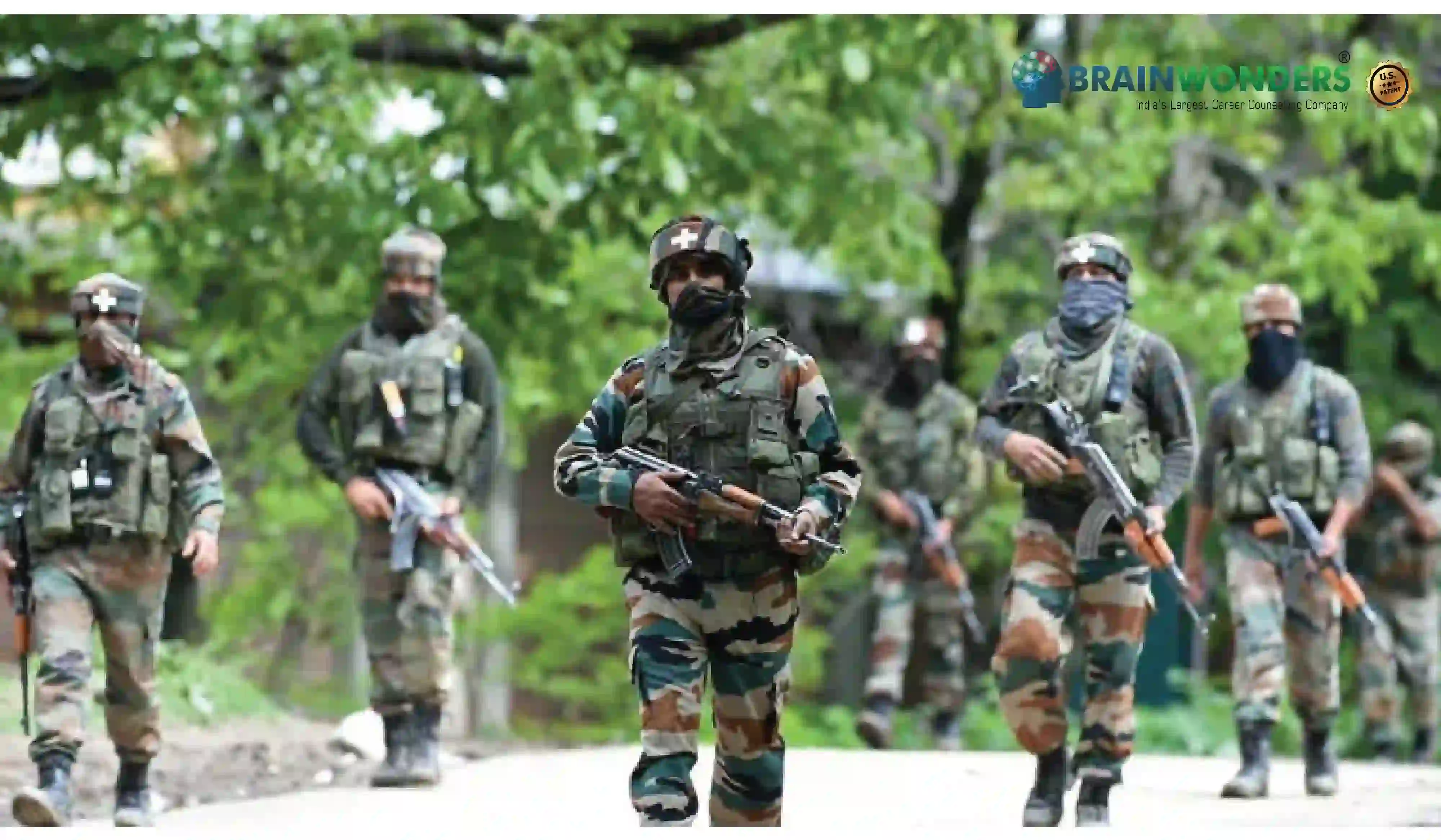How to become a Paramilitary
Overview, Courses, Exam, Colleges, Pathways, Salary

Overview
Who is Paramilitary ?
A paramilitary organization is structured similar to the army and undertakes either civil or military functions. The Ministry of Home Affairs supervises the functions of all the paramilitary forces. It’s a two-tier structure:
1. Central Paramilitary Forces: Also known as Central Armed Police Forces, assist the Indian Armed forces and Police in the protection of the country’s border and internal security. The Paramilitary Forces of India are Central Reserve Police Force (CRPF), Central Industrial Security Force (CISF), Sashastra Seema Bal (SSB), Assam Rifles (AR), Indo-Tibetan Border Police (ITBP), National Security Guards (NSG), and Border Security Forces (BSF).
2. Central Police Organizations (Forces): Working in collaboration or independent with the Indian Police Force and the federal agencies for internal security and law and order assistance. There are 11 departments under the Central Police Force.
Typical day at work
What does Paramilitary do?
1. Assam Rifles (AR): The oldest paramilitary force whose job is to hold border security operations and counter insurgency in the North-Eastern areas of India.
2. Border Security Force (BSF): The duty is to monitor and check for infiltration on the international borders against intrusion as well as provide assistance to the Indian Army in war time. They are also referred to as the 'First Wall of Defence of Indian Territories'.
3. Central Industrial Security Force (CISF): The job is to provide industrial security to Public Sector Undertakings (PSUs) such as nuclear installations, space establishments, airports, seaports, power plants, Government buildings, and heritage monuments.
4. Central Reserve Police Force (CRPF): It is an armed Force of the Union of India, to assist the State/Union Territories in Police operations to maintain law and order, monitor the internal security, helping UN peace-keeping missions, and contain insurgency. They counter Left Wing Extremism or naxal operations.
5. Indo-Tibetan Border Police (ITBP): A specialized mountain Force with men professionally trained mountaineers and skiers for identifying the frontier intelligence and security set up as well as overseeing any illegal immigration and trans-border smuggling along the Indo-Tibetan border. They are also trained in disaster management and can be deployed in UN peace-keeping missions to other nations.
6. National Security Guard (NSG): Commonly referred as Black Cats, involved in combating terrorist activities and safeguard states from witnessing any internal disturbances. They are task oriented Force, having two elements- the Special Action Group (SAG) consisting of Army personnel and the Special Ranger Groups (SRG), consisting of the Central Para Military Forces/State Police Force personnel.
7. Sashastra Seema Bal (SSB): Formely known as Special Service Bureau, is a Border Guarding Force (BGF), situated along the Indo-Nepal and Indo-Bhutan open borders to protect infiltration from militants, traffickers, and smugglers which pose national security threat.
Abilities and Aptitude needed
What are the skills, abilities & aptitude needed to become Paramilitary?
Individuals who are patriotic, passionate to serve the nation, and have a desire to contribute to national peace can choose to join Paramilitary Force. This necessitates that they are physically and intellectually healthy.
These individuals need to display have strong discipline, be punctual, organized, determined, and dedicated for the intense training they go through. This also requires them to have good stamina and physical fitness. To be a part of the armed forces integrity and having a sense of responsibility is crucial.
When they are on the ground, they need to be alert, adventurous, courageous, be a team player, be dependable, and look out for their fellow colleagues as well as having leadership skills act as an added benefit.
They need to also possess good problem solving, judgement, and problem-solving skills. They need to also have good communication and interpersonal skills. Some amount of flexibility and adaptability to change is also necessary in order to work in harsh environments and odd hours.
Salary
Salary for Paramilitary?
Salary of Paramilitary is as follows :
- Minimum Monthly Salary: Entry-level Paramilitary personnel can expect a minimum monthly salary ranging from INR 20,000 to INR 30,000. These initial earnings are typical for individuals who have recently joined paramilitary forces and are beginning their law enforcement and security careers.
- Maximum Monthly Salary: Highly experienced and specialized Paramilitary personnel with advanced training, years of service, and roles in specialized units may earn anywhere from INR 50,000 to INR 1,00,000 or more per month. Paramilitary personnel serving in leadership positions, elite commando units, or with specialized skills may command higher salaries.
- Annual Salary: The annual salary for entry-level or junior Paramilitary personnel could range from INR 2,40,000 to INR 3,60,000. As Paramilitary personnel gain experience, take on higher responsibilities, and potentially move up the ranks, their annual income can increase from approximately INR 5,00,000 to INR 8,00,000 or higher.
- Highest Paying Jobs and Scope: Paramilitary personnel with expertise in counter-terrorism, border security, special operations, or disaster response often enjoy better salary prospects. Those serving in specialized units, participating in peacekeeping missions, or involved in high-risk operations may have enhanced earnings. The role of Paramilitary personnel is crucial in maintaining law and order, ensuring national security, and responding to emergencies. With the evolving challenges in security and the need for trained personnel to handle various situations, the demand for skilled Paramilitary personnel is expected to remain strong. Paramilitary personnel who excel in physical fitness, tactical skills, teamwork, and crisis management will likely have promising career growth opportunities in the paramilitary and law enforcement sector.
Pathways
How to become an Paramilitary?
Entrance Exam
Entrance Exam for Paramilitary ?
Courses
Which course I can pursue?
Best Colleges
Which are the best colleges to attend to become an Paramilitary?
Industries
Which Industries are open for Paramilitary?
Here are some industries and sectors that are open to paramilitary personnel:
- Law Enforcement Agencies: Paramilitary personnel serve in police forces and law enforcement agencies at various levels, including local, state, and national. They enforce laws, prevent and investigate crimes, and ensure public safety.
- Border Security and Immigration: Paramilitary personnel may work in agencies responsible for border security, immigration control, and customs enforcement. They monitor and regulate the movement of people and goods across borders.
- Counter-Terrorism Units: Paramilitary personnel are often part of specialized counter-terrorism units that respond to and prevent terrorist threats domestically and internationally.
- Special Operations Forces: Paramilitary personnel can serve in elite special forces units that conduct high-risk operations such as hostage rescues, surveillance, and unconventional warfare.
- Paramilitary Organizations: Some countries have paramilitary organizations with specific roles, such as civil defence, disaster response, and maintaining public order during emergencies.
- Peacekeeping and United Nations Missions: Paramilitary personnel may participate in international peacekeeping missions under the auspices of the United Nations, contributing to conflict resolution and stability in different regions.
- Private Security Firms: Paramilitary personnel may find employment in private security companies that offer VIP protection, asset security, and risk assessment services.
- Security Consulting and Training: Experienced paramilitary personnel may transition into security consulting and training roles, providing expertise to organizations on security measures and training personnel.
- Emergency Response and Disaster Management: Paramilitary personnel are involved in disaster response and emergency management, assisting in natural disasters, accidents, and other emergencies.
- National Guard and Reserves: Some paramilitary personnel serve in the National Guard or military reserves, balancing their civilian careers with military duties.
- Government Agencies: Paramilitary personnel may work in various government agencies responsible for security, intelligence, and defence.
- Intelligence and Counterintelligence: Paramilitary personnel can be part of intelligence agencies, gathering information, analyzing threats, and protecting national interests.
- Aviation and Maritime Security: Paramilitary personnel may be involved in aviation security, protecting airports and flights, or maritime security, safeguarding ports and vessels.
- Prison and Correctional Facilities: Paramilitary personnel may work in prison and correctional facilities, maintaining order and security among inmates.
- Environmental and Wildlife Protection: In some regions, paramilitary personnel play a role in environmental protection and wildlife conservation, combating illegal activities such as poaching and deforestation.
internship
Are there internships available for Paramilitary?
Here are some potential avenues where individuals interested in pursuing a career as paramilitary personnel can gain valuable experience:
- Police Academies: Some law enforcement agencies offer internships or ride-along programs where individuals can observe and learn from police officers during their daily duties, gaining insights into law enforcement practices and procedures.
- Military Reserves or National Guard: Joining the military reserves or National Guard can provide opportunities to undergo training and participate in exercises alongside active-duty personnel.
- Security Training Programs: Private security firms or organisations that offer security training may have internship-like programs where individuals can learn about security protocols, surveillance, and risk assessment.
- Emergency Management Agencies: Interning with emergency management agencies can provide exposure to disaster preparedness, response coordination, and crisis management.
- Criminal Justice Programs: Students pursuing degrees in criminal justice or related fields may have opportunities to complete internships with law enforcement agencies or paramilitary units.
- Government Agencies: Some government agencies involved in security, defence, and intelligence may offer internships that provide insights into their operations and missions.
- Military Affiliated Programs: Military and veteran support organisations may offer internship-like programs to assist individuals transitioning into paramilitary careers.
- Security Consulting Firms: Interning with security consulting firms can provide exposure to risk assessment, security planning, and consulting services.
- Law Enforcement Volunteer Programs: Some police departments have volunteer programs that allow individuals to assist with community policing efforts and gain exposure to law enforcement activities.
- Ride-Along Programs: Some police departments allow civilians to participate in ride-along programs, accompanying officers on patrols and experiencing law enforcement firsthand.
- Academic Research and Analysis: Interning with research institutions or think tanks focused on security and defence can provide insights into policy analysis, threat assessment, and strategic planning.
- Community Outreach and Engagement: Paramilitary organisations often engage with communities through outreach programs. Interns may participate in community events and initiatives.
Career outlook
What does the future look like for Paramilitary?
Apart from the high-grade pay, paramilitary forces also gain free perks such as free ration, travel and medical allowance, etc. depending upon the rank and force.
They are exclusively trained in horseback riding and other various self-defence styles. They generally work full-time. However, working hours change from occupational speciality, rank, service branch and military needs. Officers are allotted various shifts, and duty could be of the night shift or of even 24 hours.
An individual climbs up the ladder of ranks after gaining the necessary experience and education in each force.


